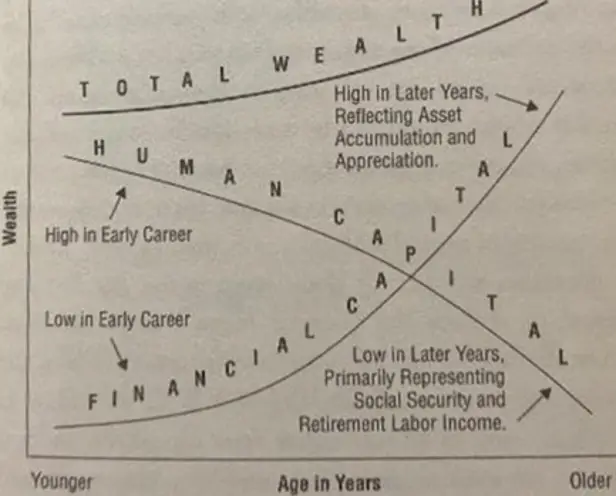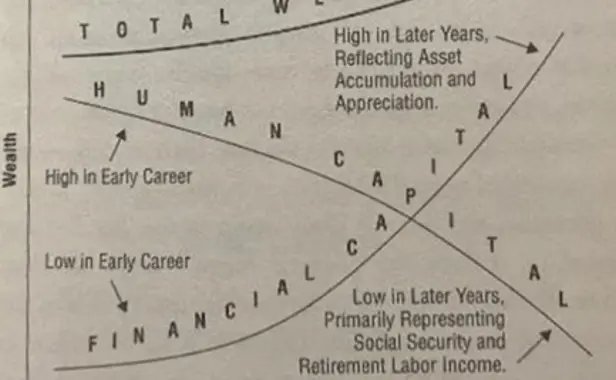Getting Rich Vs. Staying Rich
You get rich differently than you stay rich.
Some get rich with concentration, and some stay rich with diversification.
Concentration when you are young is your human capital. It can be your W-2 J.O.B. and a high savings rate. Or a personal business or real estate empire.
Once you are rich, you aim human capital towards staying rich. While you should keep some concentration (do what you love or are good at), it is also time to take some cards off the table. You’ve got to stay rich, too.
Let’s talk about getting rich and staying rich.
Getting Rich vs. Staying Rich
What does your human capital curve look like? How hard do you plan to work, and for how long? I think you can never retire, retire early.
Getting rich means maintaining your human capital while increasing your financial capital. Staying rich means maintaining your human capital because what good is money if you are not around and kicking to spend it?
Staying rich involves diversification.
The goal is total wealth, which slowly increases over time as human capital is turned into financial capital.

Above, on the top, is total wealth. Notice how, even early in your life, total wealth is high because you have massive human capital. That’s your potential energy for turning human capital into financial capital.
I also like how financial wealth increases even after you die. This assumes a legacy. Even as your human capital plummets, your total wealth increases through the power of investments—making money on your money.
But I don’t like that human capital plummets! I hope we can do better than that.
Both getting and staying rich begin with knowing the purpose of investing and then understanding risk.
Why Invest?
For the DIY investor: why invest?
What is the purpose of money? Why do you need Money?
Money is deferred time. It is a medium of exchange where work/time is stored.
People usually say money is a medium of exchange for goods and services. Yes, it is that, but what it really is is time. Money is Time.
Money is merely a commodity, which makes it truly fungible. It doesn’t matter what you did to earn it, where it came from, and it certainly doesn’t matter where it goes. Money is deferred time.
So, when you get rich, you use your time in exchange for money. Staying rich is more complicated than that. But staying rich might be closer than you think when you understand the concept of enough.
After deciding to invest, you must select your asset allocation and individual assets. Some jump to asset investing, and their asset allocation is the haphazard collection of investments they wind up with.
But for a DIY investor, we know what to invest in because we know what returns we are trying to get.
What Returns Should I Try to Get?
Seriously, what are your return expectations right now? Answer that for me, and I bet you know your asset allocation.
You can get historical records of return expectations depending on your asset allocation.
So, what are your current return expectations?
What is your asset allocation? Same question.
Once you know your asset allocation, 90% of your returns are known. The other 10% is what you get from investment selection.
So, you need to know asset allocation and then focus on the other 10%. That little sliver represents your best anxiety-adjusted return.
What are Anxiety-Adjusted Returns?
Anxiety-adjusted returns are what you get after all your foibles.
It is how behavioral finance earns its living in your own story. It is the effect behavior has on long-term investment returns.
If you sell (even once!) at the wrong time, you may be worse off than if you never invested in the first place. Think about that—one behavioral miscue in 20 years can negate the benefit of participating in the growth of the American economy (which is what stock market investing is).
How can I get the best possible returns, understanding that it is only human to want to sell out at the worst possible times?
Best Possible Returns
OK, if you want the best possible returns over your life, you should be 100% equities until the day before a market crash. Then you sell! Easy, right?
You don’t even have to predict every market crash… ride right through them when young. Crashes mean the stock market is on sale when you are young; however, as you get old, the sequence of returns risk needs consideration 5-10 years before you start portfolio withdrawals.
Stocks are actually more risky than bonds the longer you hold them, but only if you don’t get asset allocation right before your retirement.
You will never get the best possible returns. It is better to hope for the best anxiety-adjusted returns.
Return Expectations When Getting Vs. Staying Rich
So, what are your real-world, quality, anxiety-adjusted return expectations when getting rich and staying rich? You invest your time and, eventually, your money because you expect a positive return.
Your return expectations increase over time when getting rich since you are mostly human capital. But that is the point; you must make your human capital come true! The goal is to turn human capital into non-human capital assets. And here, I mean assets in the broadest sense because even while you are young and investing in your human capital daily, you must live and invest in your non-working self.
When staying rich, you need to have positive return expectations, too. Why not? Sure, you want to die with zero, but you can leave a legacy behind and still die with zero if you have oversaved for retirement.
That’s just it. Oversave for retirement, and you can have whatever return expectations you please.
Invest for the Best, Expect the Worst
Summary – Getting Rich Vs. Staying Rich
You get rich differently than you stay rich.
Do something well (concentration), and keep at it (diversification).
Doing something well requires longevity and enjoyment. You can sacrifice your life for your career for a while, but eventually, you get something out of it. You have to live your life.
And once you are rich, you’ve got to stay rich, too.
